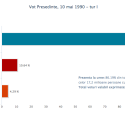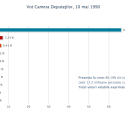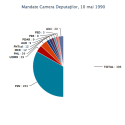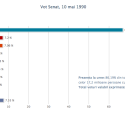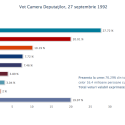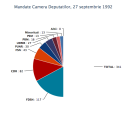IMPORTANT DEVELOPMENTS
- POLITICS. Victor Ponta: I wish continuing governing in the USL formula.
- ELECTIONS. PSD remains the favorite in the European Parliament elections.
- FINANCE. USD deems appropriate to introduce a special tax, which would apply solely to wages and very high bonuses, as those in ASF.
- GOVERNMENT. PM Victor Ponta, PSD President presented, in a press conference, “The economic results in 2013 – targets for 2014-2015”.
- ECONOMIC GROWTH. Romania, surprising growth rate in Q4 2013, the best for the past five years.
- ECONOMY. Romania registered important economic progresses in 2013.
.
1. Victor Ponta: I wish continuing governing in the USL formula
Prime Minister Victor Ponta, PSD President, said Thursday, February 13, 2014, that he wishes to continue the governing in the USL formula and will make every effort to maintain this political project.
‘From my point of view, as Prime Minister and co-Chairman of USL, I definitely want a continuation of the governing in the USL formula. I think all those who were at the base of forming the USL -PSD-PNL-PC-UNPR – are necessary because we have a difficult effort, to govern against the Basescu regime, who in the past year will likely do more harm than it did in the preceding nine years and for this reason I will make every effort for the USL to get past this crisis and to govern the country well and to fulfill another goal – that to end the Basescu regime’, said Ponta, in a telephone intervention on Antena 3.
According to the Head of the Executive, those who talk about the breaking of the USL ‘do Basescu’s game’.
‘I think many people talk and especially people who do not have the responsibility of government. ( … ) We have presented ourselves, in 2012, to the Romanians in the formula of the Social Liberal Union, those who have presented themselves then, namely Crin Antonescu, Daniel Constantin, Gabriel Oprea and I, as party leaders and as our parties, we still have many things to do together, ( … ) the only one who has to gain from breaking the USL is Traian Basescu’, said Victor Ponta.
The PSD President said that there were moments of crisis over which USL leaders have passed and he will resume talks with PNL. ‘There is absolutely nothing to negotiate; there was no question of someone losing something. All liberal ministers stay with their portfolios, Mr. Johannis, as he wanted, will be Minister of the Interior and Deputy Prime Minister coordinator for the economic ministries’, added Victor Ponta.
PM Victor Ponta said he wants political stability and has the power to overcome anything that may offend him, in the context of negotiations to restructure the USL Government.
‘I think the seeds of division that Mr. Basescu has planted in the minds of some of those who I see now as being very active in recent days – when the USL and the Government had problems I did not see them, but now they appear – I think these seeds bear fruit and then it is my duty to all Romanians, because the Government is of all Romanians, to assure them that I want stability, that I have the power, firstly personal, to overcome anything that might upset me or is not as I would consider perfect’, said the Prime Minister, in a telephone intervention on Antena 3.
The Head of Government added that he wants USL members to be in the Government at all times, and not just at certain times. ‘I want all of us to govern, not to govern from morning to afternoon and in the evening to be in the opposition. That happened to the Democratic Convention, with the DA Alliance and went wrong. I care very much about the solidarity of the four parties that form the USL’, said Ponta.
PSD sources stressed that PNL is not right when they ask for the dissolution of USD, because it would have violated the USL protocol. The USL Protocol refers strictly to local, parliamentary and presidential elections. These elections are subsumed under the provisions of the USL protocol. The USL protocol does not specify anything about the European elections. Furthermore, PSD leaders showed that for 8 days the PNL clearly stated that they do not mind the appearance of USD, that they were not surprised.
In fact, Crin Antonescu stated on February 10: „That we go on separate lists was known long ago. The Union or the electoral alliance for the European elections constituted today is no surprise. From my point of view is normal thing, already expected, it is an alliance formed by our allies and I wish good luck for the EU elections. (…) we will stand in the European elections under the banner of the PDL. There is no confusion in this regard and that is what interests us”.
Social democratic leaders also stressed that, despite the today criticism of PC, in 2011-2012, Mr. Antonescu and Mr. Constantin came together with PSD as the Center-Right Alliance PNL+ PC formula, showing they were surprised by the change of attitude of the liberal leaders.
.
2. PSD remains the favorite in the European Parliament elections
If the European elections were held next Sunday, USD would get 41% of the votes, PNL – 16%, PDL – 14%, UDMR – 7% and PPDD – 6%. Other parties (below 5 %) would obtain an aggregated 16%. The survey was conducted on a national sample of 990 people, with a margin of error of 3.3% in the period January 30 to February 2, 2014.
Regarding the options for the presidential elections – if next Sunday would be held the first round of presidential elections, Crin Antonescu (candidate from USL) would be voted by 32% of Romanians, followed by Isarescu (independent) – 26 %, Mihai Razvan Ungureanu (PDL+ADA ) – 19 %, Corneliu Vadim Tudor (PRM) – 9 % , Dan Diaconescu (PPDD) – 8 % and Kelemen Hunor (UDMR) – 6%.
If the current PM, Victor Ponta, would run from the PSD, he would be voted by 33% of Romanians, followed by Crin Antonescu (PNL ) – 22 %, Mihai Razvan Ungureanu (ADA) – 20 % , Corneliu Vadim Tudor (PRM) – 9 % , Dan Diaconescu (PPDD) – 8 % Catalin Predoiu (PDL) – 4% and Kelemen Hunor (UDMR) – 4%.
.
3. USD deems appropriate to introduce a special tax, which would apply solely to wages and very high bonuses, as those in ASF
ASF is an institution which sets its own salaries and bonuses, not being funded from the budget. In these cases, one of the options for managing the situations of disproportionate wages would be taxing high salaries through a special tax, assessed USD leaders. PSD and Prime Minister Victor Ponta proposed, since last year, such a measure, which would have introduced a tax on high salaries from the state, the measure was discussed with the IMF, but meanwhile the PNL partners changed their mind on its application, said sources close to the Social Democrats.
They said that the party has consistently supported the need to reduce wage disparities between the levels of state payroll. USD has proposed an analysis of the wages in ASF in a parliamentary committee, in response to revelations in the media. However, ASF management’s proposal, to halve the wages for 2014, was assessed as „positive” by the Social Democrats.
Transgaz recorded a profit above expectations
Natural gas transporter Transgaz Medias, controlled by the state, reported in the last trimester of the last year a net profit of 177.4 billion lei (about 40 million euros). The profit is more than 2.3 times higher compared to the same period in 2012 and by 65% above the average estimated by the analysts, of 107.3 billion lei (24.3 billion euros). In all 2013, the net profit of Transzag returned to growth by 2.3%.
Transgaz is not the only company managed by state, which under USL management, recorded a profit. Hidroelectrica’s profit in 2013 was 200 million euros – equivalent to the gains registered by the company over the past 11 years! The figures have confirmed, from USL leaders’ perspective that „by stopping contracts with smart guys and by stopping the organized theft in Hidroelectrica contributed to the relaunch of the company”. According to Government assessments, Hidroelectrica became a performing company. The gain was higher by 47 million lei in comparison with the level budgeted for the entire year.
.
4. PM Victor Ponta, PSD President presented, in a press conference, “The economic results in 2013 – targets for 2014-2015”
Prime Minister Victor Ponta, PSD President, considers that Romanian authorities are not too ambitious if they hope that the growth trend will remain above 3%, given that Romania recorded in 2013, an advance of GDP more than expected, of 3.5%, according to the first estimates of the National Statistical Institute, given Friday, February 14, 2014, to the media.
‘The economic growth which stayed at the basis of the construction of the budget for 2014 is 2.2 %, with a deficit of 2.2%. We have almost a flat rate here for growth and deficit. I want very much not to respect this equality and, if in 2013 we started with the idea of an increase of 1.6 % and reached a 3.5 %, I think we are too ambitious, hoping to keep the growth trend over 3%, and the continued reduction of the budget deficit falls into the obligations that Romania has assumed when signing the tax treaty’, said Ponta, Friday, in a press conference at the Victoria Palace.
The Prime Minister showed that public investment will exceed the budget deficit nearly three times in 2014 and will account for 6% of the GDP, 40 billion lei respectively.
2.1 billion lei will be allocated in agriculture from the state budget, of which 1.5 billion lei are subsidies to support farmers and 0.6 billion lei are complementary national direct payments in the plant sector.
Investments in rural areas will increase from 14.6 billion lei in 2013 to 18.4 billion lei in 2014, representing an advance of 26% for sewage, water and rural development. Is also expected an increase by at least 5% of net average monthly earnings in 2014 and 2015.
Also during this year, the pensions will be indexed by 3.75%, so that the average monthly pension will exceed 200 euros. In 2015, it will increase by 4.5%.
The minimum wage will rise by 12.5% in 2014 to 200 euros. The increase of the minimum income it is also set by 4.5%.
In addition, the PM mentioned that he is considering an increase for junior teachers’ and resident doctors’ salaries to facilitate investment in education and health. At the same time, it is also considered a prudent fiscal policy to help the BNR accomplish the annual inflation targets for 2014 and 2015, respectively 2.5% plus/minus one percentage point.
The Government estimates the reduction of the unemployment rate BMI to 6.5% in 2015 and an additional 100,000 jobs in 2014 and 2015.
.
5. Romania, surprising growth rate in Q4 2013, the best for the past five years
„5% in GDP growth is these days more associated with the fittest Asian and African emerging economies than the sluggish EU countries fringe, but Romania has sprung a surprise with its Q4 2013 figures, its best for five years,” the British journalist Andrew MacDowall commented on Friday, on Beyond Brics, blog affiliated to The Financial Times.
In an article entitled ‘A new tiger? Romania hits 5.2 per cent growth in last quarter’ of 2013, the author quotes the ‘signaling’ estimates of the National Statistical Institute (INS), published Friday, according to which the GDP grew by 5.2% on the gross series and by 5.1% on the seasonally adjusted series in the last quarter of last year, compared to the same period in 2012.
Romania’s full-year rate reached 3.5 per cent, among the fastest in Europe and appreciably above a recent IMF forecast of 2.8 per cent. Meanwhile inflation, once a serious concern, fell to an all-time low of 1.1 per cent in January, according to the quoted source.
According to the author’s article, BCR, Romania’s biggest bank, said in a research note that “external demand (exports of goods and services) most likely remained the main growth driver in 4Q, as in all of 2013”. A strong harvest is also likely to have been a factor – Romania’s growth rate has historically been susceptible to agricultural fluctuations.
Nonetheless, it is a little early to be celebrating, the author of the article warned, as consumer confidence is still low. According to Beyond Brics, it is likely that this surprizing growth of the GDP in the Q4 of 2013 to be followed by a gentle slowdown in 2014, since the economic recovery remains fragile. Also, Presidential and European elections later this year may also cause a degree of market wariness.
.
6. Romania registered important economic progresses in 2013
The evolution of economic growth – one of the largest economic growths in the European Union – is a remarkable performance for Romania. Growth of 3.5% is well above the initial estimate of 1.6%.
Also, industrial production increased by 7% in 2013 compared to 2012, the second highest growth in the EU. The Government granted state aid worth 215.4 million euros in 2013 to stimulate the industry.
Inflation is at its lowest level after the Revolution. The evolution of the number of employees – nearly 100.000 new jobs created by the USL. Compared to Romania, between 2012 and 2013, Italy lost 172.000 jobs and Spain 674,000.
Romania also has one of the lowest unemployment rates between EU member states, below France or Poland, and well below the EU average. The minimum gross salary valued 600 lei in 2010, reaching in 2013 800 lei. From this increase benefited over 1 million Romanians.
The evolution of the average net wage is also encouraging – in 2013, the average salary increased by almost 300 lei, compared to 2009. The average monthly pension increased in turn: In 2010 the average monthly pension was 777 lei. In 2013 it reached 811lei.
Also progress was registered at the absorption of European funds level: In 2009 EU funds absorption was less than 1%, 0.85%. In 2013 Romania has received more money from the EC than accrued in the 2007-2012 period.
In 2013, subsidies for agriculture increased by 40% compared to 2011, and by almost 100% from 2009. Exports: in 2013, compared to 2012, exports increased by 10% from 45.07 billion euros to 49.6 billion euros.
Foreign direct investments are at the maximum of the past four years, with a plus of 27% in 2013 compared to 2012.
In 2013, our country got out of the excessive deficit procedure. Only 11 out of 28 EU countries, including Romania, have a level of deficit below 3%. Thus, in 2014, Romania fulfills all criteria for the Eurozone. If we keep up this positive trend, Romania can achieve its target of being an integrated member by 2019, stressed the Government officials.



